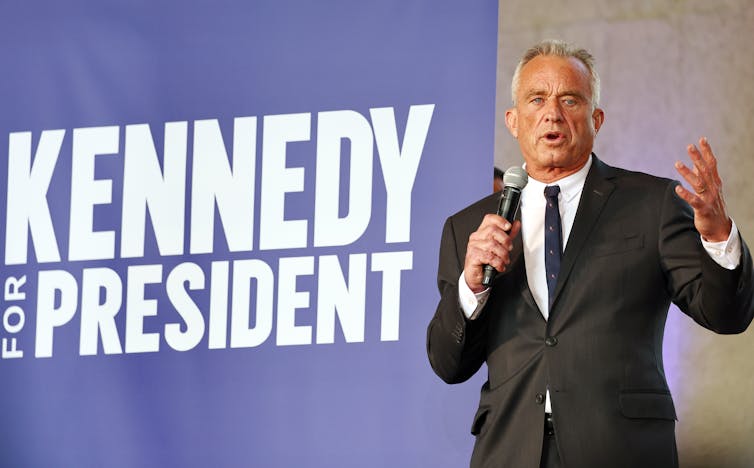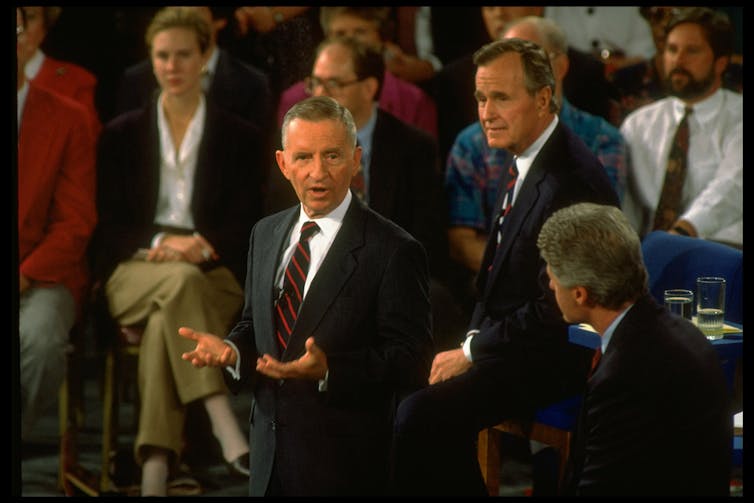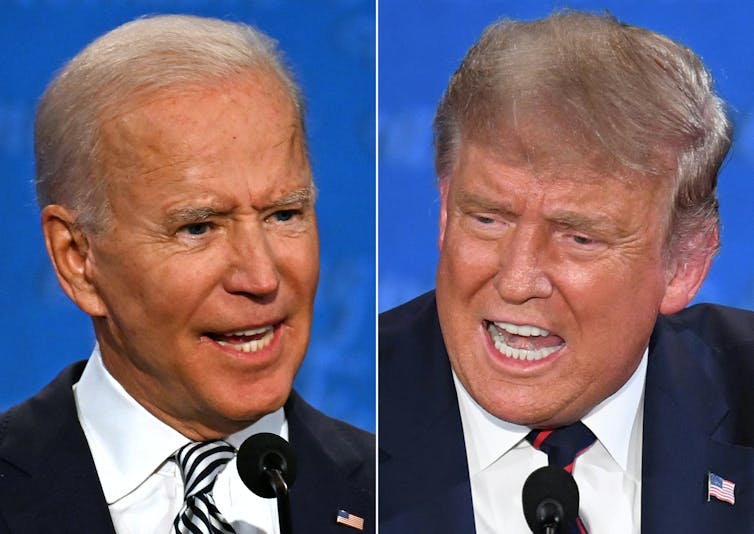
Mario Tama/Getty Images
Barry C. Burden, University of Wisconsin-Madison
Once again, the U.S. is entering a presidential campaign with some voters expressing curiosity about independent and minor-party candidates. None of those candidates has a real shot at victory in November, but they might influence the race and politics beyond the election.
There was a time about a century ago when minor-party and independent candidates were a prominent feature of the U.S. political system. While mostly limited to victories in state and local elections, they offered perspectives screened out by the Democrats and Republicans, on issues ranging from immigration to trade.
Occasionally, a promising presidential candidate will bring issues from outside the two-party system. Wealthy businessman H. Ross Perot won 19% of the popular vote in 1992 on a message opposing free trade and federal budget deficits. George Wallace’s segregationist platform allowed him to win electoral votes in five southern states in 1968. Progressive Robert La Follette picked up 16% of the vote in 1924 while railing against corporate power and corruption.
As a scholar of political parties, I find these cases remarkable because the U.S. political system generally reinforces two-party dominance.

Cynthia Johnson/Getty Images
Scaring away minor parties
A theory outlined by French scholar and jurist Maurice Duverger says that a system where a single person who gets the most votes wins office – as is the case with most prominent elections in the U.S. – will tend to foster two big parties.
The effect of what’s known as “Duverger’s law” often scares away minor-party supporters when the major-party race becomes competitive. Those minor-party supporters want to avoid spoiling the election by tilting it to the party they like least.
In addition, growth of the federal government has discouraged local alternatives to the two major parties that pop up in more decentralized systems. It seems that the more political discourse is focused on national political issues rather than state and local concerns, the more that state parties come to resemble their national counterparts.
Making it hard to run
The Democrats and Republicans are not passive observers of Duverger’s law. The two major parties have largely run minor-party competitors out of business in intentional ways.
First, Democratic and Republican officeholders adopt laws making it more difficult for others to run. Creation of the secret ballot around the turn of the 19th century provided one such opportunity. In nearly every state, lawmakers adopted state-created ballots and then banned ballot “fusion,” a once-widespread practice that allows multiple parties to nominate the same candidate.
Fusion would allow small parties to hitch a ride on big-name candidates without their supporters being concerned about “spoiling” the election. For example, if the Libertarian Party also endorsed a Republican presidential candidate, voters inclined toward the Libertarians could vote for the candidate that both parties endorsed. This allowed voters to support their preferred parties without jeopardizing the GOP’s chances of defeating the Democratic nominee.
Legislators also implemented “sore loser” laws over the course of the 20th century. These laws prevent candidates who fail to win primaries from running in the general election, stopping a candidate initially inside a party from then running outside the two-party structure.
While major parties guaranteed themselves lines on the ballot by making sure state laws put their parties on ballots, minor-party and independent candidates must gather signatures on petitions to compete. Requiring more signatures tends to reduce the number of candidates who appear on the ballot. Although lawsuits brought by candidates have led to some rules around petitioning to be struck down, it remains a significant hurdle in many states.
The major parties often marginalize minor parties by co-opting minor-party concerns into their platforms. Especially when a new party or independent candidate attracts support around a neglected issue, at least one of the major parties will try to weave it into their appeals.
In the New Deal era, Democrats tacked in a liberal direction after being challenged by the Populist Party, which had championed policies for labor unions and farmers. After seeing Perot draw so much support for his reform proposals in 1992, Republicans corralled many of his supporters in the 1994 midterm elections by advocating for ideas Perot had advanced, such as a balanced budget amendment to the Constitution and congressional term limits.

Jim Watson and Saul Loeb/AFP via Getty Images
Nationalized politics
Current times might seem ripe for an independent or minor-party candidate for president. The public generally wants more than two choices. There is widespread dissatisfaction with the two major parties and the people they will likely nominate to run for president.
There is little doubt that the Democrats and Republicans have become highly polarized on policy issues and their political styles. It is tempting to believe that polarization of the major parties opens more opportunities for less ideological parties to compete. This would mimic the late 19th century in the U.S., when major-party polarization was high and minor parties were frequent competitors.
But polarization actually discourages flirting with a minor party because the costs of losing are greater.
The current era differs from the late 19th century because in earlier periods of U.S. history voter concerns were more parochial, media outlets were more locally oriented and parties were mostly state-based entities. That left a lot of room for third-party progressives in the upper Midwest and conservative Dixiecrats in the South to find support.
Lately, party politics has become nationalized, and national issues dominate even local politics. The homogenization of party politics across the country over the past century has led to greater similarity in a party’s platforms across the states. Nearly every political issue that arises coincides with the alignment between the major parties, rather than being taken up by a splinter group in a state or region.
Chicken and egg
There are substantial hurdles to minor-party success. On one hand, a campaign organized around a single individual such as Perot or Wallace can get hung up on the liabilities of that person, and the organization can evaporate when its leader leaves the scene.
On the other hand, a campaign organized around a larger movement or set of ideas can suffer from the lack of a compelling figure to lead it. The Green Party is reasonably well organized and often gets on the ballot, but it is missing an attention-grabbing leader. The group No Labels tried to gain ballot access for a bipartisan ticket in 2024 but failed because it could not identify compelling candidates.
Although a third party is not likely to have much electoral success anytime soon, they do enrich American politics.
The campaigns of Perot in 1992 and Ralph Nader and Pat Buchanan in 2000 increased overall voter turnout. Injecting new ideas and forcing the major parties to incorporate a wider array of interests remain the most tangible results of minor-party and independent campaigns.![]()
Barry C. Burden, Professor of Political Science, Director of the Elections Research Center, University of Wisconsin-Madison
This article is republished from The Conversation under a Creative Commons license. Read the original article.